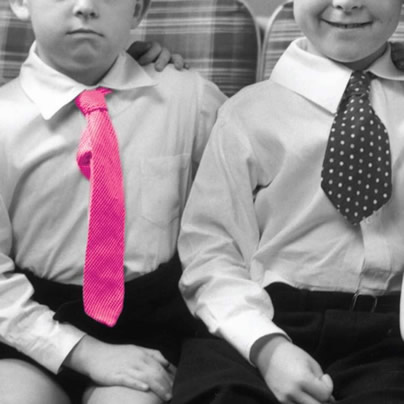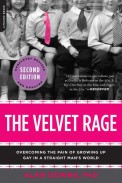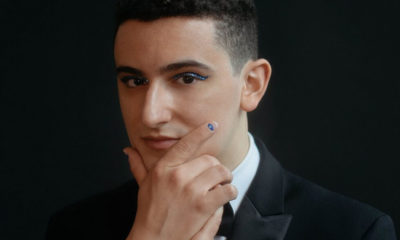Arts & Entertainment
The baggage of shame
New edition of gay classic explores closet hangover

‘The Velvet Rage: Overcoming the Pain of Growing Up Gay in a Straight Man’s World’
By Alan Downs (second edition, fully revised and updated)
DaCapo Lifelong
$15.99
252 pages, includes index
To out or not to out?
At this point in your life, you’ve made your decision but sometimes, you get a little angry that it’s even an issue. Sometimes that anger really gets you down, enough to make you want to just sit and think — or sit and drink, and that’s not good, either.
You’ve had enough hate flung your way. You’ve had your share of isolation and family problems. So isn’t it time to get your share of love and acceptance? In the completely revised, updated edition of “The Velvet Rage” by Alan Downs, you’ll find a road map for the journey.
Is self-destruction inherent in gay men?
Alan Downs believes so, and he thinks he knows why: shame.
Shame, he says, is the “fear of being unlovable.” It’s “not embarrassment over being gay; it is the belief that being gay is a … symptom of your own mortally flawed psyche.” And perhaps because it’s a “secret [a man] cannot reveal,” it often leads to self-destructive habits including suicide.
Shame starts in childhood.
The first man you loved, says Downs, was your father. If he withheld acceptance, you turned to your mother and were “drawn to the feminine.” This led to a change in family dynamics, which might have taught you to hide “ugly realities” as a means of survival and avoidance, resulting in shame’s accompanying rage.
To live a life of happiness, Downs says, there are three stages that gay men must endure. The first is characterized by being overwhelmed by shame, coping with it by “splitting,” or leading two discordant lives. Splitting helps avoid shame, but leads to a breakdown in relationships and a crisis in identity.
Stage two is marked by compensation for shame and a “belief that there is something fundamentally flawed,” internally. This is where addiction and depression often appear, especially when former validation is no longer enough to “soothe the gay man’s distress.” Resolution of this takes “all gay men” to the next stage.
In stage three, a gay man “seeks a better life for himself.” Old self-destructive behaviors no longer hold interest. Relationship trauma (betrayal, abuse, abandonment and relationship ambivalence) is healed. Joy becomes possible.
Aside from the overgeneralizations, “The Velvet Rage” is pretty good.
The beginning chapters of this book may make readers feel like a bobble-head doll, nodding, nodding, nodding. That’s eerie, because it may be hard not to see yourself in at least some of what author Alan Downs portrays, in fact.
What is most appealing about this book, though, are its last chapters. There, Downs helps readers along with his “Skills for Leading an Authentic Life,” which are good strengths to cultivate, no matter where you are (or are not) on Downs’ continuum.
Meant, perhaps, for a younger man who’s just starting this journey, I also think this book has words of wisdom for older gay men, too. If you’re in search of comfort and a more peaceful life, “The Velvet Rage” is a book to check out.

Team DC, the umbrella organization for LGBTQ-friendly sports teams and leagues in the D.C. area, held its annual Night of Champions Awards Gala on Saturday, April 20 at the Hilton National Mall. The organization gave out scholarships to area LGBTQ student athletes as well as awards to the Different Drummers, Kelly Laczko of Duplex Diner, Stacy Smith of the Edmund Burke School, Bryan Frank of Triout, JC Adams of DCG Basketball and the DC Gay Flag Football League.
(Washington Blade photos by Michael Key)




















The 2024 National Cannabis Festival was held at the Fields at RFK Stadium on April 19-20.
(Washington Blade photos by Michael Key)
















Covering the @NatlCannaFest at RFK Stadium for @WashBlade . Stop by the LGBTQ+ booth and pick up a paper if you are here. pic.twitter.com/is7hnsaPns
— Michael Patrick Key (@MichaelKeyWB) April 20, 2024
Theater
‘Amm(i)gone’ explores family, queerness, and faith
A ‘fully autobiographical’ work from out artist Adil Mansoor

‘Amm(i)gone’
Thorough May 12
Woolly Mammoth Theatre
641 D St., N.W.
$60-$70
Woollymammoth.net
“Fully and utterly autobiographical.” That’s how Adil Mansoor describes “Amm(i)gone,” his one-man work currently playing at Woolly Mammoth Theatre.
Both created and performed by out artist Mansoor, it’s his story about inviting his Pakistani mother to translate Sophocles’s Greek tragedy “Antigone” into Urdu. Throughout the journey, there’s an exploration of family, queerness, and faith,as well as references to teachings from the Quran, and audio conversations with his Muslim mother.
Mansoor, 38, grew up in the suburbs of Chicago and is now based in Pittsburgh where he’s a busy theater maker. He’s also the founding member of Pittsburgh’s Hatch Arts Collective and the former artistic director of Dreams of Hope, an LGBTQ youth arts organization.
WASHINGTON BLADE: What spurred you to create “Amm(i)gone”?
ADIL MANSOOR: I was reading a translation of “Antigone” a few years back and found myself emotionally overwhelmed. A Theban princess buries her brother knowing it will cost her, her own life. It’s about a person for whom all aspirations are in the afterlife. And what does that do to the living when all of your hopes and dreams have to be reserved for the afterlife?
I found grant funding to pay my mom to do the translation. I wanted to engage in learning. I wanted to share theater but especially this ancient tragedy. My mother appreciated the characters were struggling between loving one another and their beliefs.
BLADE: Are you more director than actor?
MANSOOR: I’m primarily a director with an MFA in directing from Carnegie Mellon. I wrote, directed, and performed in this show, and had been working on it for four years. I’ve done different versions including Zoom. Woolly’s is a new production with the same team who’ve been involved since the beginning.
I love solo performance. I’ve produced and now teach solo performance and believe in its power. And I definitely lean toward “performance” and I haven’t “acted” since I was in college. I feel good on stage. I was a tour guide and do a lot of public speaking. I enjoy the attention.
BLADE: Describe your mom.
MANSOOR: My mom is a wonderfully devout Muslim, single mother, social worker who discovered my queerness on Google. And she prays for me.
She and I are similar, the way we look at things, the way we laugh. But different too. And those are among the questions I ask in this show. Our relationship is both beautiful and complicated.
BLADE: So, you weren’t exactly hiding your sexuality?
MANSOOR: In my mid-20s, I took time to talk with friends about our being queer with relation to our careers. My sexuality is essential to the work. As the artistic director at Dreams of Hope, part of the work was to model what it means to be public. If I’m in a room with queer and trans teenagers, part of what I’m doing is modeling queer adulthood. The way they see me in the world is part of what I’m putting out there. And I want that to be expansive and full.
So much of my work involves fundraising and being a face in schools. Being out is about making safe space for queer young folks.
BLADE: Have you encountered much Islamophobia?
MANSOOR: When 9/11 happened, I was a sophomore in high school, so yes. I faced a lot then and now. I’ve been egged on the street in the last four months. I see it in the classroom. It shows up in all sorts of ways.
BLADE: What prompted you to lead your creative life in Pittsburgh?
MANSOOR: I’ve been here for 14 years. I breathe with ease in Pittsburgh. The hills and the valleys and the rust of the city do something to me. It’s beautiful, it’ affordable, and there is support for local artists. There’s a lot of opportunity.
Still, the plan was to move to New York in September of 2020 but that was cancelled. Then the pandemic showed me that I could live in Pittsburgh and still have a nationally viable career.
BLADE: What are you trying to achieve with “Amm(i)gone”?
MANSOOR: What I’m sharing in the show is so very specific but I hear people from other backgrounds say I totally see my mom in that. My partner is Catholic and we share so much in relation to this.
I hope the work is embracing the fullness of queerness and how means so many things. And I hope the show makes audiences want to call their parents or squeeze their partners.

















